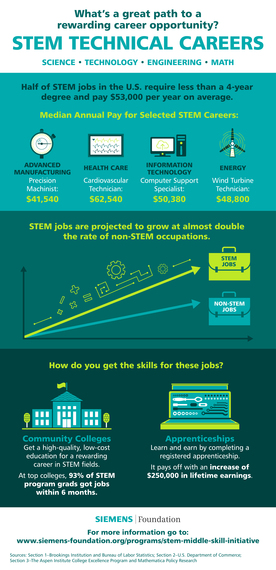It's true: America's middle class is shrinking. That isn't just campaign rhetoric or a powerful myth. America's middle class recently lost its majority status for the first time in 45 years.
The shift is proof that upward mobility and the American dream is increasingly elusive, an ominous -- even dangerous -- development that impacts all of us. But there is room for optimism. Part of the problem is that many Americans are finding the doors to well-paying jobs shut. We can open those doors by ramping up training and helping more Americans gain badly-needed new skills.
Our action must begin by making peace with a fundamental reality: that a high school diploma alone is no longer a reliable ticket into the middle class.
Consider these findings from Georgetown University's Center on Education and the Workforce:
•The Great Recession not only devastated the blue collar economy - it literally erased many of those jobs. Workers with at least some college education filled more than 95 percent of the post-recession jobs created.
•In 1973 three of four jobs required a high school education or less. Soon -- by 2020 - two out of three jobs will require some postsecondary education.
Note the words: some postsecondary education.
The so-called blue-collar jobs that undergirded our middle-class economy for decades now go by different names -- middle-skilled, or skilled technical -- in a mix of industries and career fields. Some of these positions require a bachelor's degree. Yet a large percentage of them -- half by some counts -- can be obtained by earning an associate's degree or completing training programs, many offered by community colleges. This can be done inexpensively, if not for free, without adding to the $1.3 trillion in student debt now shared by 42 million Americans.
Middle-skill jobs will yield half of all job openings through 2022. Two and a half million new, skilled technical jobs are expected to be added to the workforce by next year alone. But while middle-skill positions account for 54 percent of all U.S. jobs, only 44 percent of the country's workers are trained to that level, therein sowing the seeds of our national skills gap. A skills gap that's in fact a training gap, as Siemens USA President and CEO Eric Spiegel often says.
It's a marketing gap, too. Middle-skill careers are too often seen as a fallback option instead of the true career pathway they are.
Here are two important steps we should consider:
Bring STEM to the forefront of all education and training -- and not just for those pursuing four-year degrees and higher. STEM middle-skill jobs pay an average of $53,000 a year and are in high demand, but the U.S. is at a significant disadvantage because only 16 percent of American high school seniors, according to the U.S. Department of Education, are proficient in math.
Students also benefit from learning about real-world STEM applications outside the classroom. Schools and companies can work together to give students an early work history that makes them more employable and helps students see what could be theirs -- beyond just good grades -- if they apply themselves in the classroom.
Expand opportunities for young people, students or workers trying to reinvent themselves through "earn and learn programs." Apprenticeships, for example, are a proven win-win for society. People who complete one have a better shot at entering a thriving career and earning a postsecondary credential without accruing student debt, while employers get a pipeline of skilled workers. In Germany, where apprenticeships are a national priority, Siemens has more than 10,000 apprentices per year. Apprenticeships are a significant reason for the country's low youth unemployment rate.
There is good momentum to expand apprenticeships in the U.S., including 46 new public-private efforts supported by the U.S. Department of Labor's American Apprenticeship grants issued late last year.
Still, in the U.S., apprenticeships are more limited in scope compared to other industrialized countries. Apprenticeships are used by only a few U.S. industries, and youth, women, and minorities have been underrepresented in the programs. Traditional higher education institutions have struggled to build apprenticeships into curriculums; states haven't developed a strong enough infrastructure to support their growth; employers have had a tough time leveraging them.
This is not to say that scaling up apprenticeships and work-based learning is the whole solution. But it does point to the significant shift in thinking we need to substantively enhance opportunity in America: the recognition that it's not just about what government should do, or shouldn't do; it's about all of us.
Many people struggling in the economy still hold the power to do anything they set their mind to. For them, the American dream isn't gone; it's hidden beneath harmful stereotypes and a lack of information about the opportunities available.
For leaders in philanthropy, business, labor, education, economic development, and government, or anyone who cares about the issue, our responsibility is to make sure those committed to improving themselves, their families, and their communities are encouraged and properly directed. To meet that responsibility, we must shine a brighter light on the solid pathways to well-paying jobs and focus on making sure that hard-working people have a ladder to climb.
Our country has a deep and wonderful history of maximizing the potential of talented people. The challenge ahead of us now -- and the way we'll rebuild our middle class -- is to focus our energies on making sure no talent goes to waste.

